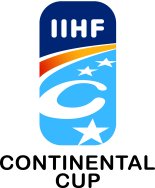DUNAUJVAROS - Hockey can be a funny game at times. With over 20 years of coaching experience at the very top end of Swedish hockey, Stephan Lundh was planning a break from the game when an unexpected call from south-eastern Europe whetted his appetite to continue his career. In Dunaujvaros, Hungary.
After spending best part of his morning out on the ice putting his players through their paces ahead of the second round of the Continental Cup (played on home ice on October 21-23 where group B hosts, Dunaujvarosi Acelbikak play HYS The Hague, Netherlands, Spain's CH Jaca, and White Caps Turnhout, Belgium), Lundh speaks to IIHF.com to explain that an adventurous streak played a big part in his decision to depart the port city of Gothenburg in Sweden for the steel town of Dunaujvaros.
"To come to an environment you know very little about can only widen your knowledge and ability as a coach," says Lundh. "The most important thing for me is to feel that there will be a challenge, and I must admit that I had the same feeling about coming here to Dunajuvaros as I had when I started working for the Swedish Association to coach their U18 national team."
A glance at Stephan Lundh's C.V makes for an impressive reading. Born and bred in Stockholm, his coaching career quickly took off at the very end of the 1980's after injury problems ended his playing days.
It was with Nacka HK, at the time an affiliation team with Stockholm giant Djurgården, he first dipped his toes into the stormy waters of ice hockey coaching. But he was quickly promoted to be part of Djurgården's coaching staff in the early 1990's. There he kept his eyes and ears open to learn from Lars Falk who led the team to consecutive Swedish and IIHF European Cups.
Djurgården gave him a solid foundation which put him in good stead for a flourishing coaching career. Five seasons at Elitserien mavericks Malmö followed, before moving on to Frölunda in Gothenburg prior to the 2004-05-season. There he enjoyed great success.
During the NHL’s lock-out season, Lundh led a star-studded Frölunda (with Daniel Alfredsson, Henrik Lundqvist, Per-Johan Axelsson, Martin Plüss, Sami Salo, Tomi Kallio, Samuel Påhlsson, Niklas Andersson) to the Swedish championship and he followed it up with second place in 2005-06.
In between his club coaching years, Lundh was on separate occasions employed by the Swedish Ice Hockey Association. Between 1998 and 2000, he was part of Sweden's national team coaching staff and the best result was a bronze medal at the 1999 IIHF World Championships.
In 2007-2010 he held the position as head coach of the Swedish U18 national team, with his finest hour being when guiding a largely unfancied crop of players to second place at the IIHF U18 World Championships in Belarus in 2010.
This vast know-how from the very top of both senior and junior level that Lundh has amassed over the years, is now being fully implemented in Dunaujvaros, south of Hungary's capital Budapest and together with Szekesfehervar very much the heartland of Hungarian hockey.
And Lundh's new club, nicknamed the Steel Bulls, is not wasting any time in its attempts to pushing forward on all fronts in order to move the club in the right direction.
As of this season, Dunaujvaros are not only taking part in the Hungarian-Romanian championship, but they are also new members of the Nationalliga A, the second tier of Austrian ice hockey. This double-dipping keeps Lundh, his coaching staff and players busy as there is almost constantly one group of players on the road.
But with not yet two months into his new job as head coach of Dunaujvaros, Lundh enjoys his new and busy life which is almost entirely spent either at the rink, where a normal working day starts at nine in the morning and finishes at eight at night, or on the road.
But he feels that the investment is slowly but surely starting to pay dividends.
"We are a very offensive-minded team with many fast and creative players," he says. "They have the same attitude to hockey as the ones I've had in my last job at Frölunda. They want to improve and get better, and I expect as much from these players as I did from the ones I coached in Sweden."
"And I think the players appreciate that. But the difference to Sweden is that here, there isn't a great pool of players to choose from, so you need to work incredibly hard with each and every one."
Although Lundh has been on the winning side in European cup competition in the past (as part of the coaching staff of Djurgården, who won the now defunct IIHF European Cup two years in a row between 1991 and 1992) the Continental Cup is a new experience for Lundh. But one that he sees plays an important part in the club’s progress.
"I have great belief in my team ahead of this tournament," he says. "I spend 99% of my efforts on my players and hope the opponents will have to adjust to us. If not, then we will make corrections during the game."
Considering that Lundh’s club is on home ice, and that the opponents come from lesser ranked IIHF countries such as the Netherlands, Spain and Belgium, one can only assume that HYS The Hague, CH Jaca and White Caps Turnhout will have to do most of the adjusting.
Anything else than a group win and promotion to the Continental Cup third round for the Steel Bulls from Dunaujvaros, will be considered as failure.
Group C of the Second round of the Continental Cup will be played October, 21-23 in Miercurea Ciuc, Romania with hosts HSC Csikszereda, fighting it out with Liepajas Metalurgs (LAT), Olimpija Ljubljana (SLO) and Beibarys Atyrau (KAZ) for a top-spot and promotion to the third round, played at the end of November 2011.
HENRIK MANNINEN
|
 |
 |







